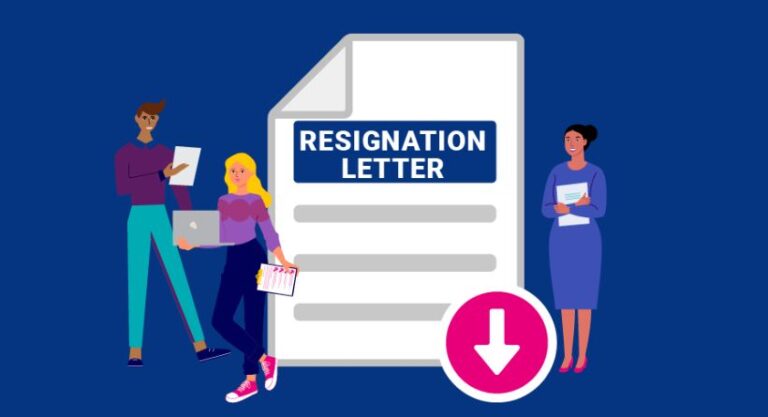Learn how to write a job resignation letter that is professional, clear and concise.
- Making and sending a professional resignation letter might influence how coworkers and potential employers will perceive you going forward.
- Your letter of resignation needs to be brief. Mention your last day of employment, offer to help with the transition, and thank your soon-to-be former employer.
- In your resignation letter, avoid venting your frustrations or making negative remarks about the business or your colleagues.
- This article is for workers who want advice on how to draught a suitable resignation letter.
No matter the circumstances, quitting a job is a significant life decision that has to be carefully considered. A crucial step in the resignation process that can have a lasting impact on current and potential employers is writing and sending a professional resignation letter. Knowing the potential significance of this letter, it’s crucial to know what to include in it and precisely how to write it.
What is a resignation letter?
When an employee decides to leave a job, they should provide their employer with a proper letter of resignation. A job resignation letter is a formal announcement of an employee’s leave strategy, according to Pat Roque, a career transformation counsellor at Rock on Success.
According to Roque, “It is a necessary document that becomes a part of your employee records.” “Consider it the final chapter of your tale with your former employer.”
Your letter should be in a professional tone, let your employer know when you’ll be departing, offer to help with the transition to a replacement, and express gratitude for the time you spent working with them. Being professional, polite, and helpful regardless of how you feel about your job or your boss offers closure and a way ahead.
Keep your options open because you never know when you might want to come back or even collaborate with former coworkers in a different position, advised Roque.
Although you will probably be required to submit a conventional resignation letter, James Rice, head of SEO at Picked, advised that it is typically preferable to arrange a meeting with your supervisor to personally deliver the letter and discuss your resignation in person.
What your resignation letter should say
A few fundamental components should always be included in your job resignation letter, even though the particular contents might be customized to your position and company.
Roque recommended adding the following components:
- your deadline. Indicate your termination date in writing, ideally two weeks beforehand.
- Assistance with the changeover Make clear that you are committed to ensuring a simple and seamless transfer, and that you are available to talk to your boss or replacement about your workload and status updates.
- Thank you for the chance. Regardless of your differences with a coworker or how toxic the workplace may have become, find something kind to say.
- Request for guidance (optional). Ask for detailed instructions regarding your last job commitments and other matters if you are not yet aware of your company’s leave protocol. Some employers might want you to go right away, while others would want you to help with a transition over the course of two weeks, or they might ask you to work from home and return your laptop to HR on your last day.
Co-founder of Resume Deli Alex Twersky stated that expressing thanks, alerting the staff to your leaving, and offering to help train a replacement are crucial components of a job resignation letter.
“Imagine… ” When writing your resignation letter, keep in mind the best moments you’ve had at work, advised Twersky. Even if they weren’t, let your employer think they were excellent. It might lead to a solid recommendation for you.
What your resignation letter shouldn’t say
Knowing what to say and what not to say in a resignation letter are both crucial skills. In their official letters, many employees make the error of incorporating too many intimate information and sentimental comments.
The following information should be left out of a formal resignation letter:
- why you’re departing. Although you might feel the need to do so, your resignation letter does not necessarily need to offer an explanation of your decision to leave. Rice advised against mentioning in your resignation letter that you think your new job offers a superior product, service, working environment, compensation, or benefits package. Keep your tone upbeat and professional.
- What you disliked about your employment. You shouldn’t vent your frustrations or disparage your soon-to-be former employer or coworkers in your resignation letter. Before filing the letter, Roque advised letting go of your resentment. In order to make sure your letter is sufficiently polite and brief before submission, she also advised having someone else proofread it.
- emotional assertions Twersky emphasized the significance of writing your letter in a cool, businesslike tone. An emotional or confrontational letter will only make things worse for you. Don’t give up being angry, advised Twersky, even if you are exhausted and disgruntled. Avoid using “I feel” or “I think” comments unless they are followed by affirmative assertions.
Don’t try to cross any people off your list when composing your letter because you might need their assistance in the future.
If you’re staying in the same industry, Rice said you might still network in the same circles or wish to come back in the future. Your employers might also provide you a reference. With social networks like LinkedIn, it may be challenging to avoid keeping in touch with former coworkers, which is always a good idea.
These are also wise suggestions to bear in mind when notifying your manager or supervisor of your impending departure. You don’t have to explain your reasoning if you don’t want to; short and basic is acceptable. Simply maintain a professional demeanor during the exchange.
Sample resignation letter
Here is a sample resignation letter that you can customise with your own information. Keep in mind that you are not necessary to state your resignation reason in your letter:
[Present day]
Dear [Name of Supervisor],
Accept this letter as formal notice of my resignation from the position of [Title]. I’ll be leaving [Company] on [End date].
I am happy to assist you with any training activities during my last weeks on the job to make the transition after my departure easier. I’m going to make sure my replacement has clear instructions and current paperwork.
Please allow me to thank you for the education and experience I have received while working here. I am very appreciative of the time I have spent working with our team and the connections I have made in the business world. It’s been a pleasure working with you, and I hope to run into you again soon.
Sincerely,
[Your printed name and signature]
If you decide to give a reason for leaving, either in your letter or in your conversation with your employer, be specific and upbeat, concentrating on the benefits of the transition rather than the events that led to it. Be formal and professional at all times.
Rice advised, “Keep in mind that people quit their positions every day, and your manager will be accustomed to the process. “By being respectful and considerate when quitting your work, you’ll make everything go more smoothly and put yourself in a good position for success in the future.”
Benefits of providing a resignation letter
Check your employee handbook before bidding your employer farewell because some businesses demand that employees submit a formal resignation notice. Even though a corporation might not have any guidelines in place requiring you to send a formal resignation letter, doing so is usually recommended.
Giving in a formal, professional resignation letter at the very least enhances your reputation. It lessens the likelihood of resentment or uncertainty by setting the tone for your departure as one of professionalism and courtesy. It also allows you the opportunity to express your gratitude to your employer and, if necessary, to offer your assistance with the transition process.
A formal resignation letter acts as a record for the resignation. Your resignation letter might serve as written documentation that you gave sufficient notice to your employer, which may need a specified amount of notice (two weeks is typical). You can use your resignation letter as evidence in court if there are issues with your final paycheck or the last day of employee perks, for example.







